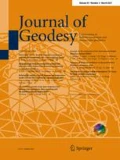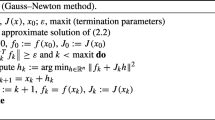Abstract
The least-squares ambiguity Decorrelation (LAMBDA) method has been widely used in GNSS for fixing integer ambiguities. It can also solve any integer least squares (ILS) problem arising from other applications. For real time applications with high dimensions, the computational speed is crucial. A modified LAMBDA (MLAMBDA) method is presented. Several strategies are proposed to reduce the computational complexity of the LAMBDA method. Numerical simulations show that MLAMBDA is (much) faster than LAMBDA. The relations between the LAMBDA method and some relevant methods in the information theory literature are pointed out when we introduce its main procedures.
Similar content being viewed by others
References
Agrell E, Eriksson T, Vardy A, Zeger K (2002) Closest point search in lattices. IEEE Trans Inform Theory 48:2201–2214
Babai L (1986) On Lovász’ lattice reduction and the nearesr lattice point problem. Combinatorica 6:1–13
De Jonge P, Tiberius, CCJM (1996) LAMBDA method for integer ambiguity estimation: implementation aspects. In: Delft Geodetic Computing Center LGR-Series, No. 12
U, Pohst M (1985) Improved methods for calculating vectors of short length in a lattice, including a complexity analysis. Math Comput 44:463–471
E, Beutler G (1990) Rapid static positioning based on the fast ambiguity resolution approach “FARA”: theory and first results. Manus Geod 15:325–356
Golub GH, Van Loan CF (1996) Matrix computations, 3rd ed. The Johns Hopkins University Press, Baltimore, Maryland
Grafarend EW (2000) Mixed integer-real valued adjustment (IRA) problems. GPS Solut 4:31–45
Hassibi A, Boyed S (1998) Integer parameter estimation in linear models with applications to GPS. IEEE Trans Signal Proc 46:2938–2952
Joosten P, Tiberius CCJM (2002) LAMBDA: FAQs. GPS Solut 6:109–114
Landau H, Euler H (1992) On-the-fly ambiguity resolution for precise differential positioning. In: Proc ION GPS-92, pp 607–613
Lenstra HW Jr (1981) Integer programming with a fixed number of variables. Tech Rep 81-03, Departmentt of Mathematics University of Amsterdam, The Netherlands
Lenstra AK, Lenstra HW Jr, Lovász L (1982) Factoring polynomials with rational coefficients. Math Ann 261:515–534
Liu LT, Hsu HT, Zhu YZ, Ou JK (1999). A new approach to GPS ambiguity decorrelation. J Geod 73:478–490
Lou L, Grafarend EW (2003) GPS integer ambituity resolution by various decorrelation methods. Zeitschrift fur Vermessungswesen 128:203–211
Pohst M (1981) On the computation of lattice vector of minimal length, successive minima and reduced bases with applications. ACM SIGSAM Bull 15:37–44
Schnorr CP, Euchner M (1994) Lattice basis reduction: improved practical algorithms and solving subset sum problems. Math Program 66:181–199
Teunissen PJG (1993) Least-squares estimation of the integer GPS ambiguities. In: Invited lecture, section IV theory and methodology, IAG General Meeting, Beijing, China. Also in Delft Geodetic Computing Centre LGR series, No. 6, pp 16
Teunissen PJG (1995a) The invertibe GPS ambiguity transformation. Manu Geod 20:489–497
Teunissen PJG (1995b) The least-squares ambiguity decorrelation adjustment: a method for fast GPS ambiguity estitmation. J Geod 70:65–82
Teunissen PJG (1998) GPS carrier phase ambiguity fixing concepts. In: Teunissen P, Kleusberg A (eds) GPS for geodesy, 2nd ed. Springer, Berlin Heidelberg New York, pp 317–388
Teunissen PJG (1999) An optimality property of the integer least-squares estimator. J Geod 73:587–593
van Emde Boas P (1981) Another NP-complete partition problem and the complexity of computing short vectors in a lattice. Rep 81-04, Mathematisch Instituut, Amsterdam The Netherlands
Viterbo E, Biglieri E (1993) A universal decoding algorithm for lattice codes. Quatorzieme colloque GRETSI, 611–614, Juan-Les-Pins, France
Viterbo E, Boutros J (1999) A universal lattice code decoder for fading channels. IEEE Trans Inform Theory 45:1639–1642
Random simulation and GPS decorrelation. J Geod 75:408–423
Xu P, Cannon E, Lachapelle G (1995) Mixed integer programming for the resolution of GPS carrier phase ambiguities. In: IUGG95 Assembly, Boulder, 2–14 July. Also in Technical Report Nr. 2000.2, Department of Geodesy and Geoinformatics, Universität Stuttgart, Germany
Author information
Authors and Affiliations
Corresponding author
Rights and permissions
About this article
Cite this article
Chang, X.W., Yang, X. & Zhou, T. MLAMBDA: a modified LAMBDA method for integer least-squares estimation. J Geodesy 79, 552–565 (2005). https://doi.org/10.1007/s00190-005-0004-x
Received:
Accepted:
Published:
Issue Date:
DOI: https://doi.org/10.1007/s00190-005-0004-x




